Project management is a challenging field that demands exceptional skills and organization. Numerous project management experts, industry leaders, and renowned figures have shared their wisdom and insights, encapsulating their experiences and lessons in concise and powerful quotes.
These project management quotes inspire, guide, and motivate aspiring and seasoned project managers. Whether you’re a budding project manager or a seasoned pro, the right words can ignite your ingenuity, fuel your drive, and propel you toward extraordinary achievements.
In this article, we will explore a collection of 19 thought-provoking quotes that shed light on the art of leading successful projects.
Wisdom from the Masters:19 Project Management Quotes
Let’s dive into the quotes. I know you are here for the masters’ quotes, not for mine.
Inspirational quotes
Let’s start with some inspirational quotes to keep you running.
1. “The only way to do great work is to love what you do.” – Steve Jobs
This quote from Steve Jobs, the visionary co-founder of Apple Inc., emphasizes the importance of passion and enthusiasm in achieving remarkable results.
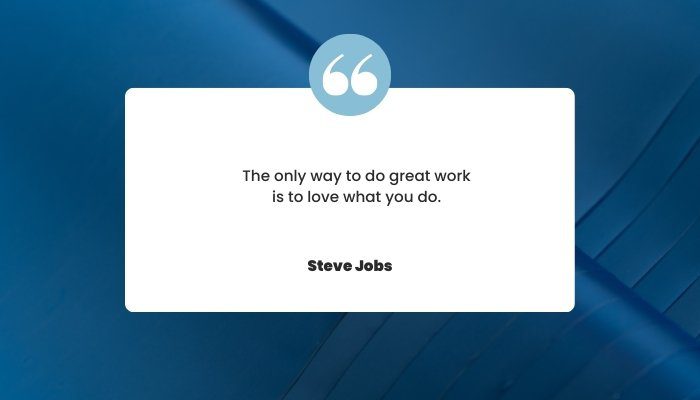
In the context of project management, this principle holds significant value. When project managers and team members genuinely enjoy their work, they are likelier to invest their energy, creativity, and dedication into delivering exceptional outcomes.
A passionate project manager inspires and motivates the team, fosters a positive work environment, and encourages innovation. In the broader business realm, embracing this philosophy can transform one’s professional life by continually boosting personal fulfillment, career satisfaction, and the drive to strive for excellence.
How to implement this in your business life?
Implementing the philosophy of loving what you do in your business life involves several key steps:
- Identify your true passions and interests. Then, consider how you can align them with your business or career. Finally, reflect on what aspects of your work excite you and bring you joy.
- Define clear and meaningful goals that resonate with your passions. When your goals align with your interests, you’ll naturally feel more motivated and enthusiastic about pursuing them.
- Look for opportunities that align with your passions and purpose. For example, explore roles, projects, or entrepreneurial ventures that allow you to engage in work that you genuinely enjoy and find fulfilling.
- Foster an optimistic attitude towards your work. Focus on the aspects you enjoy and appreciate, even during challenging times. Practice gratitude and celebrate small victories along the way.
- Embrace a mindset of constant learning and growth. Seek opportunities to expand your skills, knowledge, and expertise in exciting areas. This ongoing development will deepen your love for your work.
- Connect and collaborate with individuals who share your passion and enthusiasm. Build a supportive network that inspires and motivates you on your business journey.
- Remember to maintain a healthy work-life balance and prioritize self-care. Taking care of your well-being allows you to sustain your passion and energy in the long run.
2. “Success is not final, failure is not fatal: It is the courage to continue that counts.” – Winston Churchill
In project management, this quote encourages viewing success as a stepping stone and failures as opportunities to learn and improve. In business, the quote empowers individuals to overcome setbacks, pursue goals with determination, and embrace challenges for personal growth. This mindset fosters resilience and drives innovation for better project delivery.
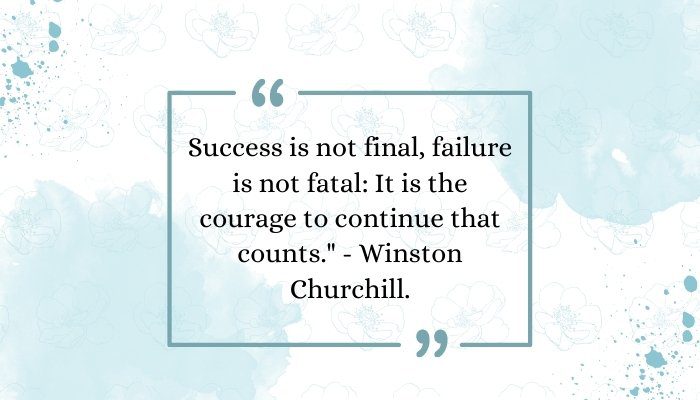
Churchill’s words remind us to have the courage to persist, learn from failures, and stay focused on goals. Doing so, we overcome obstacles, grow professionally, and succeed in project management and business endeavors.
How to implement this in your business life?
- Adopt a mindset that sees failures as learning opportunities and views success as an ongoing journey.
- Set realistic goals and establish measurable milestones.
- Foster a resilient and supportive work culture that encourages growth and innovation.
- Seek feedback from customers, clients, and colleagues to drive continuous improvement.
- Cultivate perseverance and determination in the face of challenges and setbacks.
- Invest in continuous learning and development to stay ahead in your industry.
3. “The road to success is always under construction.” – Lily Tomlin
This quote emphasizes the dynamic nature of achieving success. It underscores the importance of adaptability and continuous improvement in project management.

Projects are subject to changes, requiring flexibility and agile decision-making. Similarly, in business life, embracing this mindset is vital. Success is not a fixed endpoint but an ongoing journey that demands constant learning, innovation, and adjustment.
By understanding this, project managers and individuals can navigate challenges, seize opportunities, and achieve their goals.
How to implement this in your business life?
- Emphasize learning, personal development, and embracing new challenges.
- Seek feedback from colleagues, mentors, or customers for improvement.
- Set clear and measurable goals to track progress and strive for continuous improvement.
- Reflect on experiences and make adjustments for refinement.
- Be open to change and adapt strategies based on new information or market conditions.
- Foster innovation by encouraging creativity and valuing new ideas.
- Invest in professional development through training and workshops.
- Collaborate with industry members to broaden perspectives and learn from their experiences.
- Celebrate successes, maintaining a positive mindset and motivation.
Leadership quotes
Leadership is a crucial part of project management. Let’s see some famous quotes about the leadership for project management.
4. “Great leaders are willing to sacrifice their personal interests for the greater good of the project.” – John Wooden
This quote from John Wooden, a renowned basketball coach, indicates that influential leaders should be willing to make sacrifices and decisions that may not be personally advantageous but contribute to the project’s overall success.
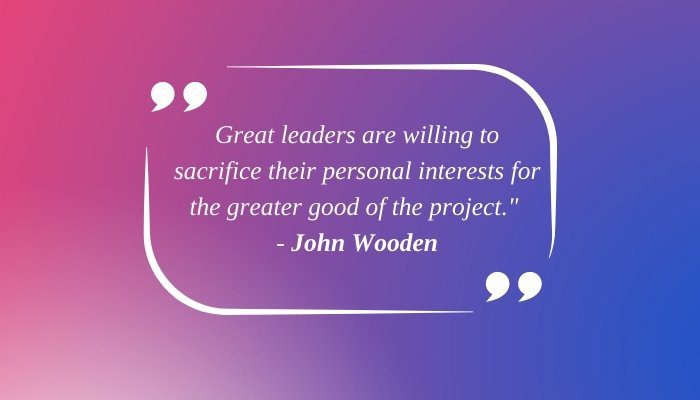
This mindset fosters collaboration, trust, and a focus on the project’s objectives, resulting in better team dynamics and outcomes. In a broader business context, embracing this philosophy cultivates a culture of selflessness, accountability, and dedication to organizational goals, leading to improved teamwork and overall business performance.
How to implement this in your business life?
- Encourage your team members to prioritize the project’s success over individual gains and emphasize the importance of collaboration.
- Demonstrate a willingness to make sacrifices for the greater good and showcase integrity and ethical decision-making.
- Clearly articulate the project’s objectives and the rationale behind decisions, ensuring everyone understands the collective goals’ significance.
- Delegate responsibility, encourage diverse perspectives, and create an environment where team members feel valued and supported.
- Recognize and celebrate the efforts and accomplishments of the entire team, reinforcing the importance of shared success.
5. “Leadership is not about being in charge. It is about taking care of those in your charge.” – Simon Sinek
This perspective from the famous author Simon Sinek highlights the importance of nurturing and supporting the project team, ensuring their well-being, growth, and success. By prioritizing the needs and development of team members, leaders create an environment of trust, motivation, and collaboration, resulting in higher engagement and productivity.
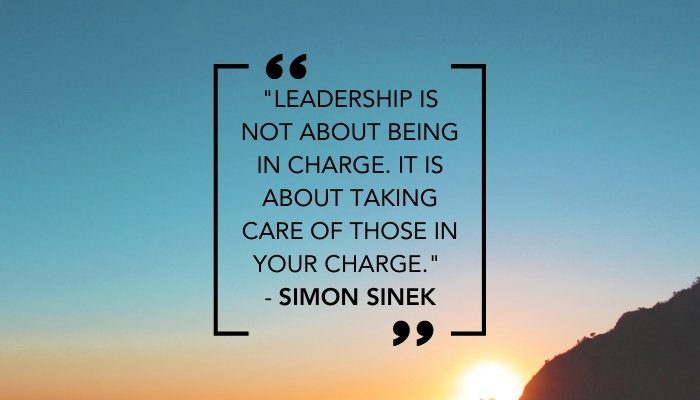
Translating this philosophy into the broader business context fosters a culture of empathy, servant leadership, and organizational health, leading to improved employee satisfaction, retention, and overall business performance.
How to implement this in your business life?
- Focus on supporting and empowering your team members rather than asserting authority.
- Take the time to understand and care for your team members’ personal and professional needs.
- Encourage open communication, listen actively, and create an environment where team members feel comfortable sharing ideas and concerns.
- Invest in developing your team members’ skills and abilities, allowing them to thrive and contribute to the project and organization.
- Pay attention to the work-life balance of your team members and provide support when needed, promoting their physical and mental health.
- Celebrate the achievements and efforts of your team members, acknowledging their valuable contributions to the project’s success.
Teamwork quotes
Project management is all about teamwork. So let’s see some teamwork quotes to make your teamwork better.
6. “Talent wins games, but teamwork and intelligence win championships.” – Michael Jordan
Everyone knows Michael Jordan – a legendary basketball player. He highlights the significance of teamwork and intelligence in achieving long-term success.
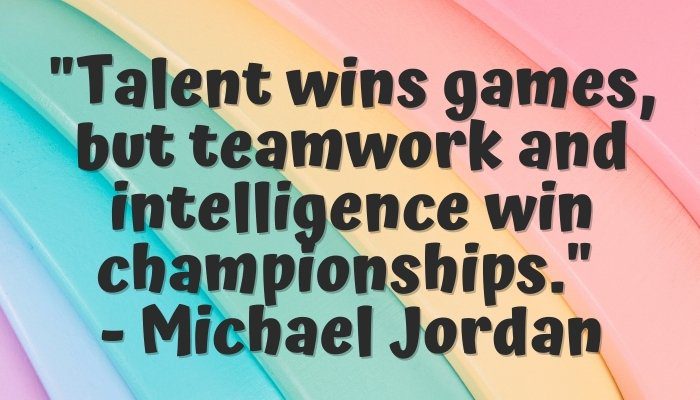
This quote underscores the importance of fostering effective teamwork, encouraging collaboration, and leveraging the team’s collective intelligence in project management. It emphasizes that success depends not solely on individual skills but on working together, sharing knowledge, and making intelligent choices.
Translating this principle into a business context emphasizes collaboration, strategic thinking, and fostering a culture of teamwork, ultimately leading to sustainable business success.
How to implement this in your business life?
- Encourage teamwork, open communication, and a shared sense of purpose.
- Bring together individuals with different skills, experiences, and perspectives to enhance problem-solving and creativity.
- Encourage continuous learning and knowledge sharing among team members to leverage collective intelligence.
- Break down silos and facilitate collaboration between departments and teams to drive innovation and efficiency.
- Empower leaders who understand the value of teamwork and intelligence and can inspire and guide the team toward common goals.
- Create an environment where team members feel safe to voice their opinions, take risks, and contribute ideas.
- Recognize and reward collective successes, reinforcing the importance of teamwork and intelligence in driving exceptional results.
7. “Individually, we are one drop. Together, we are an ocean.” – Ryunosuke Satoro
Ryunosuke Satoro, a Japanese poet, conveys the transformative power of unity and collaboration through his quote. Individually, we may seem insignificant, but when we come together as a collective, our impact can be immense, akin to the vastness of an ocean.
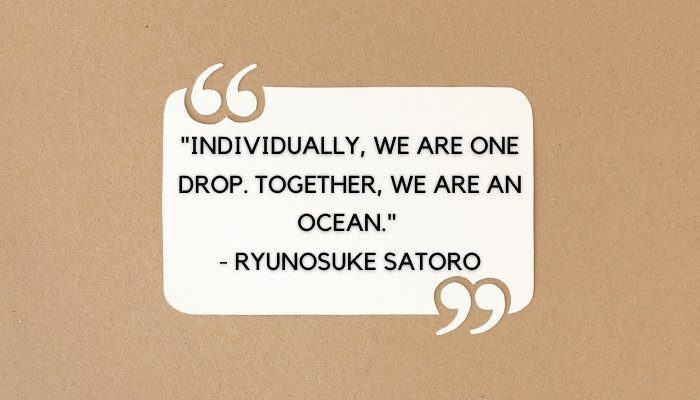
This notion emphasizes teamwork’s strength and collective effort’s value in project management. It reminds us that projects thrive when individuals unite their diverse talents, skills, and perspectives toward a common goal.
Applying this principle in a business context fosters a culture of collaboration, synergy, and shared purpose, leading to increased productivity and success.
How to implement this in your business life?
- Align team members around a common vision and goals.
- Facilitate dialogue and information sharing among team members.
- Embrace individuals’ strengths and viewpoints to foster creativity and innovation.
- Create opportunities for team members to collaborate and pool their expertise.
- Encourage cross-functional collaboration to enhance problem-solving and efficiency.
- Ensure team members have the tools and resources to work together effectively.
- Recognize and celebrate team successes, reinforcing the value of collaboration and unity.
8. “Teamwork makes the dream work.” – John C. Maxwell
John C. Maxwell, a well-known author and speaker on leadership, succinctly captures the essence of successful project management in his quote.
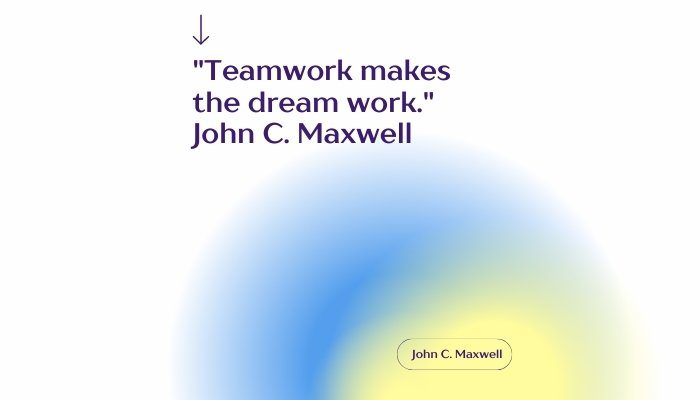
This quote underscores the significance of collaboration, coordination, and mutual support among team members in project management. Further, it highlights that a cohesive team’s combined effort and synergy are vital for realizing project success.
Translating this principle into a business context emphasizes the value of teamwork, fostering a culture of cooperation, and leveraging collective strengths to accomplish organizational objectives.
How to implement this in your business life?
- Create a culture that values and promotes teamwork and cooperation.
- Ensure team members understand their roles and how they contribute to the project goals.
- Encourage open and transparent communication channels to facilitate information sharing and problem-solving.
- Build trust within the team, encouraging members to support and rely on each other.
- Align team members around a common purpose and inspire them to work together towards a shared goal.
- Organize activities and exercises to strengthen relationships and enhance collaboration.
Time management quotes
9. “Lack of direction, not time, is the problem. We all have twenty-four-hour days.” – Zig Ziglar
Each of us has the same 24 hours a day, but without a well-defined path, time can slip away without meaningful progress. This quote highlights the importance of providing a sense of purpose and guidance in project management.
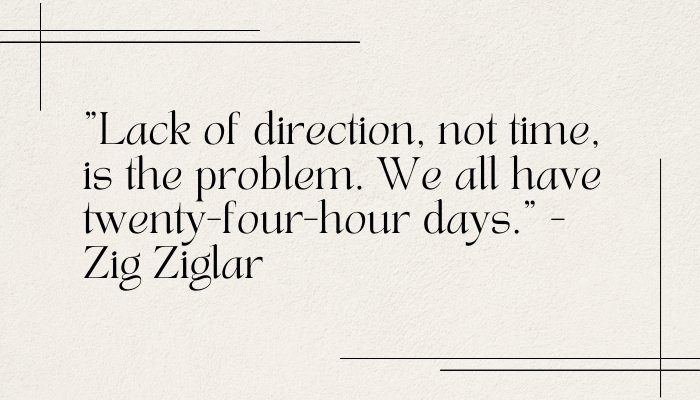
By establishing clear objectives, strategies, and plans, project leaders enable teams to utilize their time effectively, stay focused, and work towards meaningful outcomes. When applied to business, this philosophy emphasizes the need for strategic vision, goal-oriented planning, and effective leadership.
How to implement this in your business life?
- Set clear goals and objectives that align with your business vision.
- Develop a comprehensive project plan that outlines specific tasks, timelines, and deliverables.
- Communicate the project’s direction and expectations to the team, ensuring clarity and alignment.
- Provide ongoing guidance and support to team members, helping them stay on track and overcome obstacles.
- Regularly review progress and make necessary adjustments to maintain focus and momentum.
- Foster a culture of accountability and time management, encouraging individuals to prioritize tasks effectively.
- Continuously assess and refine the project’s direction, ensuring it remains aligned with the overall business strategy.
10. “Time management is an oxymoron. Time is beyond our control, but how we use it is not.” – John C. Maxwell
John C. Maxwell, a prominent author on leadership, challenges the notion of time management in this quote. Instead, this quote underscores the importance of effective time utilization. While we cannot control the passage of time, we can control how we allocate and prioritize our tasks and activities.
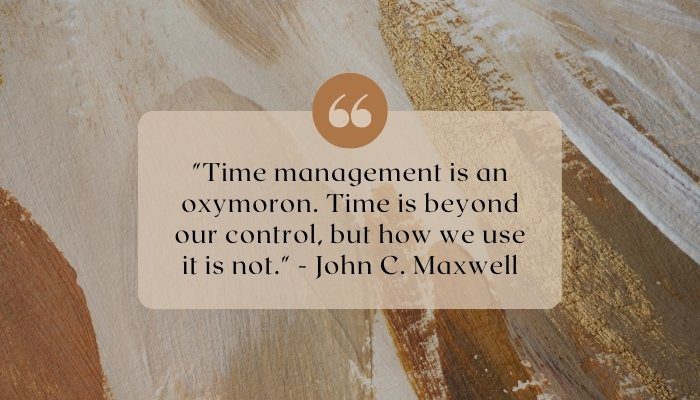
It emphasizes the significance of mindful planning, efficient task management, and making deliberate choices about how we spend our time. Applying this principle to business life promotes productivity, efficiency, and proactive decision-making.
How to implement this in your business life?
- Identify high-priority activities that align with your goals and allocate sufficient time.
- Create a well-structured schedule that outlines your daily, weekly, and monthly tasks and commitments.
- Minimize distractions and consciously avoid engaging in unproductive tasks that do not contribute to your objectives.
- Identify tasks that can be delegated or outsourced to free up your time for more strategic activities.
- Utilize techniques such as the Pomodoro Technique or time blocking to enhance focus and productivity.
- Regularly assess how you spend your time and make adjustments to optimize your productivity and effectiveness.
- Encourage your team to prioritize tasks and manage their time efficiently for better project outcomes.
11. “You may delay, but time will not.” – Benjamin Franklin
This quote serves as a gentle nudge to stay proactive and mindful of our project timelines. It reminds us that timely action and efficient execution are essential to successful project completion.

Applying this wisdom to our business lives encourages us to value and respect time, maximizing productivity and achieving our goals effectively.
How to implement this in your business life?
- Stay ahead of deadlines by creating well-defined project plans and setting realistic timelines.
- Divide projects into smaller, actionable tasks to maintain a steady momentum.
- Identify high-priority activities and tackle them promptly to avoid unnecessary delays.
- Utilize digital tools or calendars to remind yourself of important milestones and due dates.
- If overwhelmed, seek assistance from team members or consider delegating tasks to ensure timely completion.
- Stay motivated and focused by breaking the cycle of procrastination and taking immediate action.
- Continuously monitor progress, identify bottlenecks, and make necessary adjustments to stay on track.
- Acknowledge and celebrate progress, fostering a positive and productive work environment.
Communication quotes
12. “The most important thing in communication is hearing what isn’t said.” – Peter Drucker
This quote from Peter Drucker, a highly influential management consultant, emphasizes that effective communication goes beyond mere verbal exchange and entails understanding the unspoken aspects, such as body language, emotions, and underlying intentions.
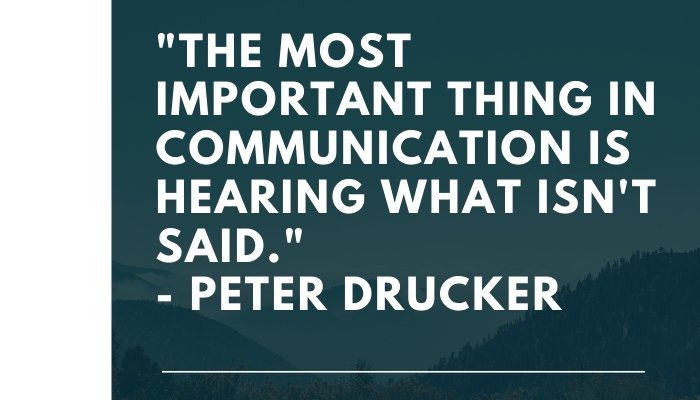
This quote underscores the critical role of attentive and empathetic listening in project management. It emphasizes the need to read between the lines, discern unexpressed concerns, and grasp the subtle cues that can profoundly impact project outcomes.
Translating this concept to business life enriches interpersonal interactions, fosters more robust relationships, and enables better collaboration and problem-solving.
How to implement this in your business life?
- Be fully present and attentive during conversations, focusing not just on words but also non-verbal cues and underlying emotions.
- Ask open-ended questions to encourage deeper understanding and uncover unspoken thoughts or concerns.
- Observe the speaker’s body language and gestures to gain additional insights into their message.
- Put yourself in the other person’s shoes, trying to understand their perspective and feelings beyond what they express.
- Foster an open environment where team members feel comfortable sharing their thoughts, concerns, and ideas.
- Enhance your ability to perceive and understand emotions, both your own and those of others, to facilitate effective communication.
- Take a moment to process information before responding, considering both the spoken and unspoken aspects of the message.
- Seek opportunities for training and development to enhance your overall communication abilities.
13. “The two words ‘information’ and ‘communication’ are often used interchangeably, but they signify quite different things. Information is giving out; communication is getting through.” – Sydney J. Harris
Information merely involves disseminating knowledge, while communication encompasses the profound ability to convey messages effectively and ensure their reception. In the realm of project management, this quote from Sydney J. Harris, an esteemed journalist, underscores the criticality of providing information and ensuring its comprehension and reception by stakeholders.
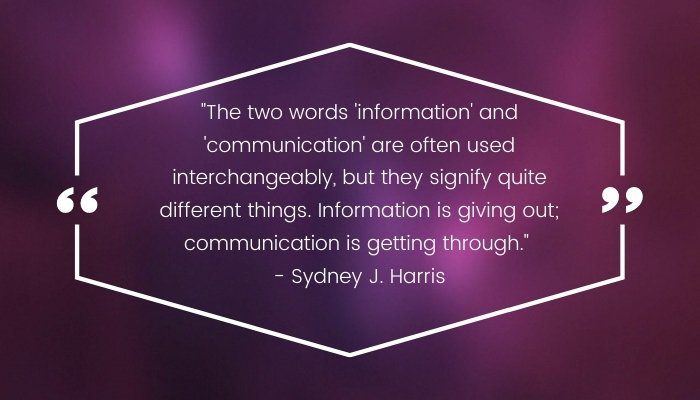
Recognizing this distinction empowers project managers to prioritize clear and concise communication, fostering mutual understanding and alignment. In addition, translating this mindset to your business life fortifies your communication skills, enabling you to bridge gaps, build connections, and achieve meaningful outcomes.
How to implement this in your business life?
- Craft your messages precisely, conveying the intended meaning effectively.
- Adapt your communication style to the preferences and needs of your audience, maximizing understanding and engagement.
- Pay attention to verbal and non-verbal cues, demonstrating your commitment to truly understanding others.
- Encourage open dialogue and invite feedback to gauge the effectiveness of your communication and make necessary adjustments.
- Utilize various communication channels, such as meetings, emails, and collaboration tools, to ensure information is received through different mediums.
- Break down complex concepts into digestible pieces, making them easier for others to grasp and comprehend.
- Establish an environment that values transparency, active listening, and constructive dialogue.
- Invest in personal growth by seeking opportunities to enhance your communication abilities, such as workshops, courses, or reading relevant literature.
14. “Good communication is the bridge between confusion and clarity.” – Nat Turner
This quote serves as a reminder of the transformative power of communication. It is the thread that weaves together the intricate tapestry of project activities and team dynamics. Clear and open communication channels lay the foundation for shared understanding, alignment, and collaboration.
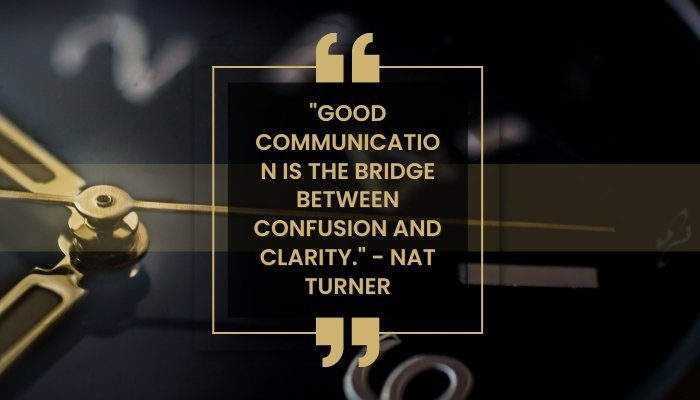
Beyond project management, this quote resonates with our broader business lives. For example, effective communication is a cornerstone of professional relationships, influencing client, colleague, and stakeholder interactions.
How to implement this in your business life?
- Create an environment that encourages open and honest communication where team members feel comfortable expressing their thoughts and concerns.
- Give your full attention when others speak, listen without judgment, and seek to understand their perspective.
- Tailor your communication approach to the context and audience by utilizing face-to-face conversations, emails, video conferences, or collaboration tools.
- Articulate project requirements, roles, and responsibilities to ensure everyone is on the same page.
- Keep stakeholders informed about project progress, milestones, and potential challenges, fostering transparency and trust.
- Consider the feelings and viewpoints of others, aiming to build connections and promote understanding.
- Encourage two-way communication by actively soliciting feedback from team members and stakeholders and valuing their insights and ideas.
- Invest in personal and professional growth by seeking opportunities to improve your communication abilities, such as workshops, courses, or seeking mentorship.
Adaptability quotes
15. “Adaptability is about the powerful difference between adapting to cope and adapting to win.” – Max McKeown
This quote underscores the notion that adaptability is about survival, seizing opportunities, and achieving victory. Within project management, this quote emphasizes the crucial role of adaptability in navigating challenges, embracing change, and driving success.
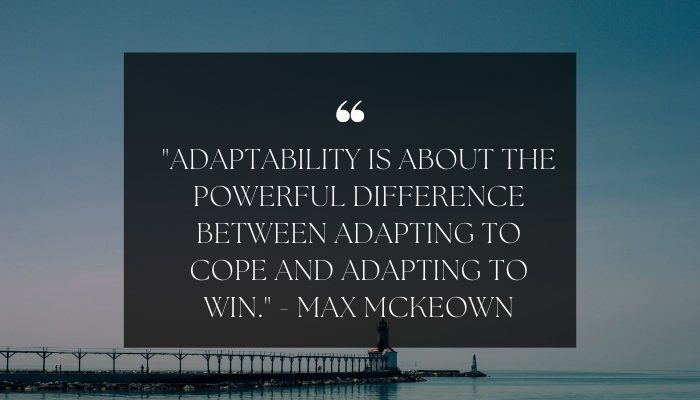
It encourages project managers to proactively respond to evolving circumstances, adjust strategies, and capitalize on new possibilities. Translating this mindset to your business life empowers you to thrive in an ever-changing landscape, seize opportunities, and achieve remarkable outcomes.
How to implement this in your business life?
- Cultivate a mindset that welcomes change, views setbacks as learning opportunities, and seeks continuous improvement.
- Adapt quickly to shifting circumstances and adjust plans and strategies to optimize outcomes.
- Encourage creativity, open-mindedness, and out-of-the-box thinking within your team, inspiring them to generate fresh ideas and approaches.
- Regularly evaluate the effectiveness of your current strategies and processes, identifying areas for improvement and making necessary adjustments.
- Build your capacity to bounce back from setbacks, learn from failures, and persevere in facing challenges.
- Anticipate industry trends and disruptions, seeking opportunities to innovate and stay ahead of the curve.
- Foster a collaborative environment that encourages exchanging ideas, experiences, and best practices, enabling collective adaptability and growth.
- Continuously expand your knowledge and skill set, staying updated with the latest trends and emerging practices in your field.
16. “The measure of intelligence is the ability to change.” – Albert Einstein
This insight from the greatest scientist of the twentieth century reverberates powerfully in project management, where adaptability reigns supreme. Project managers must be able to navigate the ever-changing landscapes, swiftly adjusting plans, strategies, and approaches as circumstances demand.
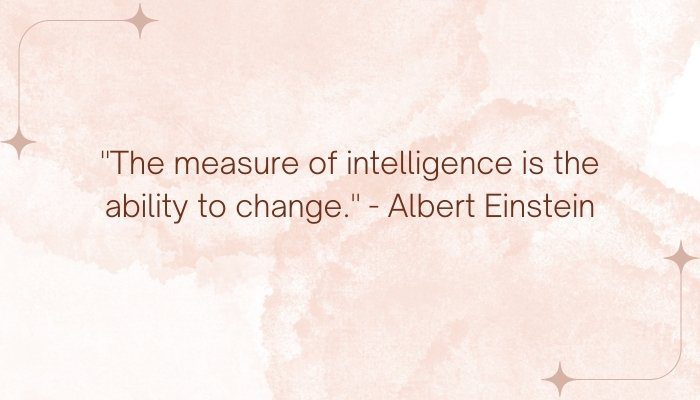
Similarly, adaptability catalyzes unparalleled success in the dynamic business world. It empowers organizations to harness the winds of change, swiftly respond to market shifts, embrace cutting-edge technologies, and seize untapped opportunities. Adaptability becomes the hallmark of greatness, propelling individuals and businesses toward extraordinary achievements.
How to implement this in your business life?
- Encourage continuous organizational learning and development, promoting a growth mindset and adaptability.
- Actively seek feedback from stakeholders, clients, and team members to identify areas for improvement and adapt accordingly.
- Create an environment that supports creative thinking, experimentation, and exploring new ideas.
- Monitor industry trends, market dynamics, and emerging technologies to anticipate changes and adapt proactively.
- Foster a diverse and inclusive workforce, as diverse perspectives and experiences can enhance adaptability and problem-solving.
- Promote agile methodologies and frameworks to enable quick and effective responses to changes and uncertainties.
- Foster collaboration and open communication among team members, facilitating the exchange of ideas and enabling adaptability.
- Develop robust change management processes to facilitate smooth transitions and minimize disruption during periods of change.
Risk management quotes
Risk management is an integral part of project management, aimed at identifying, assessing, and mitigating potential risks that could impact project success.
17. “The biggest risk is not taking any risk… In a world that’s changing quickly, the only strategy that is guaranteed to fail is not taking risks.” – Mark Zuckerberg
Mark Zuckerberg, the co-founder of Facebook, is renowned for his innovative approach and willingness to take risks. He believes that to stay ahead in a dynamic environment, embracing risks and not shying away from them is crucial.
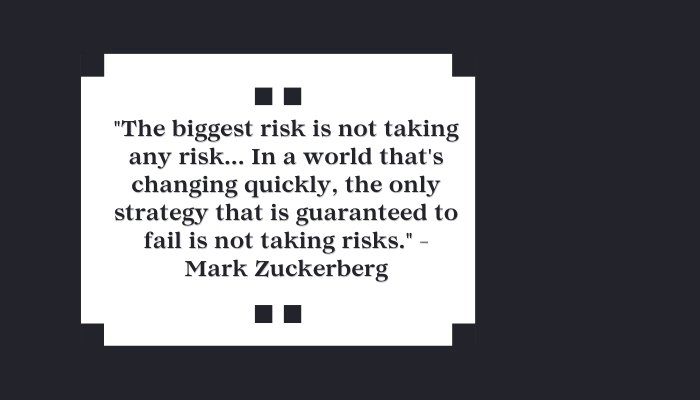
This quote emphasizes the need to adopt a proactive mindset in project management. Projects often involve uncertainties and unknown variables, and avoiding risks can limit growth and opportunities. Instead, project managers should encourage a culture of calculated risk-taking, where potential threats are thoroughly evaluated, and appropriate mitigation strategies are implemented.
The impact of this mindset extends beyond project management and into one’s business life. Embracing risks allows for personal and professional growth. It encourages individuals to step out of their comfort zones, explore new ideas, and seize opportunities that may lead to success.
How to implement this in your business life?
- Create an innovative culture that fosters open communication, inspiring employees to share fresh ideas and take calculated risks.
- Embrace experimentation and view failures as valuable lessons, driving continuous learning and growth.
- Invest in ongoing learning and development programs to boost skills and knowledge, empowering individuals to make informed decisions in the face of risks.
- Consistently assess and evaluate potential risks in your business operations, crafting robust contingency plans to mitigate their impact.
- Adopt a growth mindset that embraces challenges as opportunities, readily adapting strategies as needed.
18. “A ship in the harbor is safe, but that is not what ships are built for.” – John A. Shedd
Risk management in project management involves recognizing that taking risks is essential for progress and success. John A. Shedd’s quote metaphorically emphasizes that while staying in a safe harbor may seem secure, ships are designed to venture into the unknown.
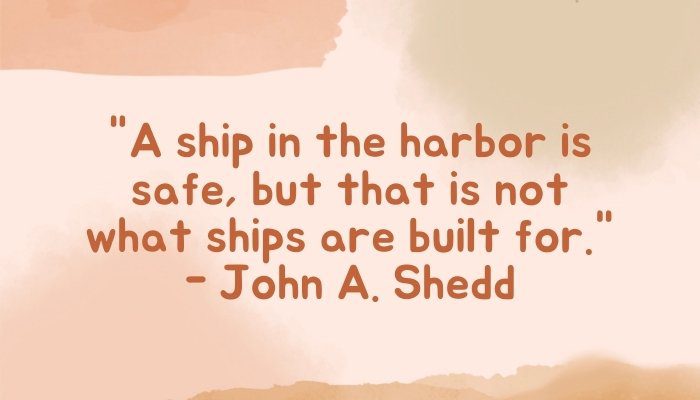
In project management, this quote reminds us that projects often involve uncertainties and potential risks. As a result, projects may miss out on breakthrough innovations and transformative outcomes by being overly cautious and staying within their comfort zone.
This perspective extends to business life, as it urges individuals to overcome their fear of failure and embrace calculated risks. As a result, individuals can discover new possibilities, enhance their skills, and achieve greater success by taking risks.
How to implement this in your business life?
- Foster “safe-failure” experiments to encourage learning and innovation.
- Promote cross-functional collaboration to generate diverse ideas and perspectives.
- Implement a risk-reward recognition system to incentivize calculated risk-taking.
- Embrace agile methodologies for adaptability and flexibility.
- Encourage continuous learning for informed decision-making.
- Seek external perspectives for fresh insights and competitive advantage.
- Use rapid prototyping to validate ideas and mitigate risks.
- Cultivate a culture of psychological safety for open risk discussions.
Learning and improvement quotes
Learning and improvement are vital in project management, continuously driving progress and success.
19. “The beautiful thing about learning is that no one can take it away from you.” – B.B. King
Learning refers to acquiring new knowledge, skills, and insights, while improvement involves applying that knowledge to enhance performance. In project management, embracing a culture of learning and improvement cultivates a dynamic environment where teams can adapt to challenges, discover innovative solutions, and refine their approaches based on past experiences.
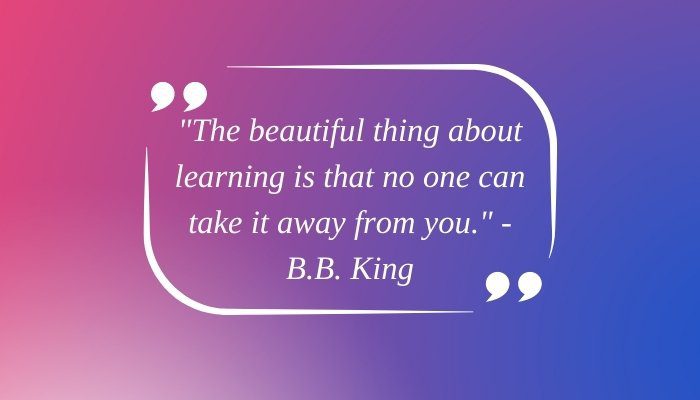
This quote’s impact on project management is significant, emphasizing the importance of ongoing learning and improvement. Embracing continuous learning allows individuals to stay ahead in a rapidly evolving business landscape. It enables them to develop new skills, adapt to changing market dynamics, and seize emerging opportunities.
How to implement this in your business life?
- Cultivate a learning culture by encouraging employees to pursue professional development opportunities.
- Ensure a safe and supportive environment where mistakes are seen as learning opportunities rather than failures.
- Encourage knowledge sharing and collaboration among team members.
- Implement regular performance evaluations and feedback sessions to identify areas for improvement.
- Allocate resources for training programs and provide access to educational resources.
- Emphasize the value of continuous learning and growth in individual and team goals.
- Promote a mindset of curiosity, experimentation, and open-mindedness.
- Celebrate successes and recognize efforts made towards learning and improvement.
Wrapping up
In the fast-paced world of project management, finding the right motivation and guidance is essential for achieving exceptional results. In conclusion, project management is a dynamic and essential discipline that requires both technical skills and a mindset for success.
The power of effective project management lies not only in the processes and methodologies but also in the inspiration and motivation it brings to the teams involved. The 19 project management quotes presented in this discussion are valuable reminders and fuel for success.
They encapsulate the wisdom of experienced professionals who have navigated project management challenges and emerged victorious. From emphasizing the importance of planning and communication to encouraging perseverance and adaptability, these quotes offer timeless insights for project managers at all levels.
